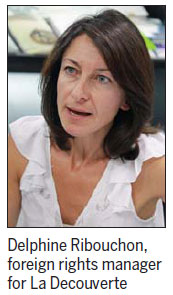Not just English
Updated: 2012-09-14 08:46
By Yang Yang and Andrew Moody (China Daily)
|
||||||||

Delphine Ribouchon believes China is potentially a major market for French publishers.
As foreign rights manager for French publisher La Decouverte, she signs about six publishing contracts a year in China out of about 100 worldwide.
"There is interest in French books generally, especially those on philosophy and history. When they have a guarantee from us that authors are important they are usually very interested in doing the translation," she says.
In 2011, China bought the rights for 706 titles from France and 881 from Germany, according to the General Administration of Press and Publication.
| ||||
Ribouchon, whose successes include political philosophy book For Marx by Louis Althusser, which has been reprinted four times in China, says local rights buyers are better informed about the English language books market.
"They tend to ask us which are best-sellers and these are the ones they are interested in. They are very efficient."
One of the best-selling foreign writers in China is the Italian Umberto Eco, author of The Name of the Rose.
Cinzia Bruno, a representative of the Italian Institute for Foreign Trade, brought 10 Italian publishers to the Beijing book fair.
"In the last few years, the copyright exchange between China and Italy has been increasing," she says.
One of the biggest Italian publishing successes in China is children's books, which achieve 21 percent of their sales in the country compared with only 4 percent in the United States.
"Children's books are successful because language is not a big problem since readers are attracted to the photos and illustrations and there is less need for translation," she says.
Holger Behm, head of the international relations and foreign rights for Cornelsen Verlag, the German educational publisher, says it takes time to build a presence in the China market.
"We are in our 11th year with a stand at the fair here. It takes a long time to get acquainted and we have only been doing real business for six years."
The patience has paid off and now China is the German company's biggest market outside of Europe and is growing by 10 percent a year.
"Long-term relationship is the key to the market. It is a particular factor here as it is in other Asian markets like South Korea," he says.
Behm says the major business in China is selling the rights of textbooks to Chinese publishers for them to be translated into Chinese.
"There is a very small market for German books in China, as you can imagine. You find the German books in some universities where they have libraries but it is not really big business," he says.
Bruno at the Italian Institute for Foreign Trade says China is not necessarily a greater challenge than any other country for a publisher from a non-English speaking country.
"The competition with English-language publishers is tough everywhere because the Italian language area is very small, even though it is the fifth most studied language in the world," she says.
"We just come across the same problems as publishers from (other non-English speaking countries) like from France, Sweden and Poland."
(China Daily 09/14/2012 page5)

 Relief reaches isolated village
Relief reaches isolated village
 Rainfall poses new threats to quake-hit region
Rainfall poses new threats to quake-hit region
 Funerals begin for Boston bombing victims
Funerals begin for Boston bombing victims
 Quake takeaway from China's Air Force
Quake takeaway from China's Air Force
 Obama celebrates young inventors at science fair
Obama celebrates young inventors at science fair
 Earth Day marked around the world
Earth Day marked around the world
 Volunteer team helping students find sense of normalcy
Volunteer team helping students find sense of normalcy
 Ethnic groups quick to join rescue efforts
Ethnic groups quick to join rescue efforts
Most Viewed
Editor's Picks

|

|

|

|

|

|
Today's Top News
Chinese fleet drives out Japan's boats from Diaoyu
Health new priority for quake zone
Inspired by Guan, more Chinese pick up golf
Russia criticizes US reports on human rights
China, ROK criticize visits to shrine
Sino-US shared interests emphasized
China 'aims to share its dream with world'
Chinese president appoints 5 new ambassadors
US Weekly

|

|










